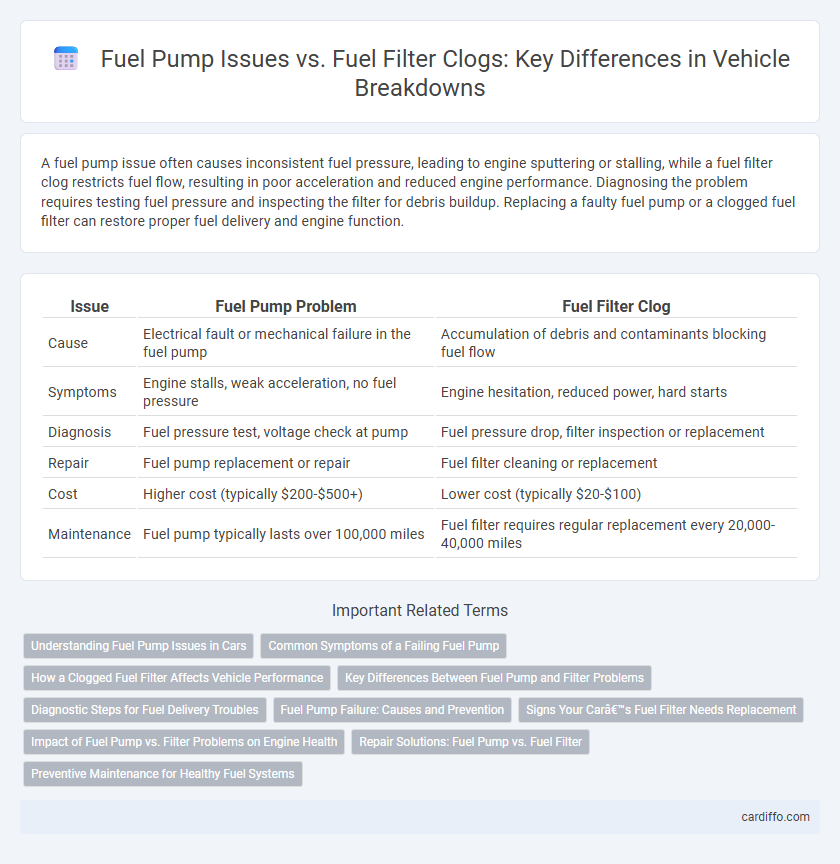A fuel pump issue often causes inconsistent fuel pressure, leading to engine sputtering or stalling, while a fuel filter clog restricts fuel flow, resulting in poor acceleration and reduced engine performance. Diagnosing the problem requires testing fuel pressure and inspecting the filter for debris buildup. Replacing a faulty fuel pump or a clogged fuel filter can restore proper fuel delivery and engine function.
Table of Comparison
| Issue | Fuel Pump Problem | Fuel Filter Clog |
|---|---|---|
| Cause | Electrical fault or mechanical failure in the fuel pump | Accumulation of debris and contaminants blocking fuel flow |
| Symptoms | Engine stalls, weak acceleration, no fuel pressure | Engine hesitation, reduced power, hard starts |
| Diagnosis | Fuel pressure test, voltage check at pump | Fuel pressure drop, filter inspection or replacement |
| Repair | Fuel pump replacement or repair | Fuel filter cleaning or replacement |
| Cost | Higher cost (typically $200-$500+) | Lower cost (typically $20-$100) |
| Maintenance | Fuel pump typically lasts over 100,000 miles | Fuel filter requires regular replacement every 20,000-40,000 miles |
Understanding Fuel Pump Issues in Cars
Fuel pump issues in cars often manifest as difficulty starting, engine stalling, or loss of power due to insufficient fuel delivery. Unlike a clogged fuel filter that restricts fuel flow, a failing fuel pump can cause inconsistent fuel pressure or complete fuel starvation. Diagnosing fuel pump problems requires measuring fuel pressure with a gauge and inspecting electrical connections to ensure proper operation.
Common Symptoms of a Failing Fuel Pump
A failing fuel pump often causes engine sputtering, difficulty starting, and frequent stalling, distinguishing it from symptoms of a clogged fuel filter like reduced fuel flow and poor acceleration. Low fuel pressure measured during diagnostics strongly indicates fuel pump malfunction rather than filter obstruction. Loud whining noises from the fuel tank area further confirm fuel pump issues, necessitating immediate inspection to prevent breakdown.
How a Clogged Fuel Filter Affects Vehicle Performance
A clogged fuel filter restricts the flow of fuel to the engine, causing reduced engine power and acceleration issues. This obstruction forces the fuel pump to work harder, potentially leading to premature pump failure and increased repair costs. Symptoms such as engine misfires, stalling, and poor fuel efficiency directly indicate clogged fuel filter problems that degrade overall vehicle performance.
Key Differences Between Fuel Pump and Filter Problems
Fuel pump issues primarily cause engine starting failures and irregular fuel pressure, while fuel filter clogs lead to reduced engine performance and stalling due to restricted fuel flow. A faulty fuel pump often results in a whining noise from the fuel tank, whereas a clogged fuel filter typically causes sputtering during acceleration. Diagnosing involves checking fuel pressure for pump problems and inspecting filter condition for blockages to pinpoint the exact cause.
Diagnostic Steps for Fuel Delivery Troubles
Diagnosing fuel delivery troubles requires differentiating between a faulty fuel pump and a clogged fuel filter by first measuring fuel pressure using a fuel pressure gauge at the fuel rail; low or inconsistent pressure often indicates a failing pump. Next, inspecting the fuel filter for visible debris or performing a flow test can confirm clogging, which restricts fuel flow and mimics pump failure symptoms. Comprehensive diagnostics also include checking electrical connections and listening for pump priming sounds to accurately isolate the root cause of fuel supply issues.
Fuel Pump Failure: Causes and Prevention
Fuel pump failure often results from electrical issues, fuel contamination, or mechanical wear, directly impacting engine performance and vehicle reliability. Preventative measures include regular maintenance, using high-quality fuel, and timely replacement of fuel filters to avoid strain on the fuel pump. Monitoring fuel pressure levels can also detect early signs of pump degradation, ensuring optimal fuel delivery and preventing costly breakdowns.
Signs Your Car’s Fuel Filter Needs Replacement
A clogged fuel filter often causes symptoms such as engine sputtering at high speeds, difficulty starting the vehicle, and frequent stalling, distinguishing it from fuel pump failure which typically results in a complete loss of power. Reduced fuel efficiency and a noticeable drop in acceleration can also indicate a clogged fuel filter restricting fuel flow. Regular inspection and timely replacement of the fuel filter can prevent damage to the fuel pump and ensure consistent engine performance.
Impact of Fuel Pump vs. Filter Problems on Engine Health
Fuel pump malfunctions cause inconsistent fuel delivery, leading to engine misfires, poor acceleration, and potential engine stalling, which severely affects engine performance and longevity. Fuel filter clogs restrict fuel flow, causing reduced fuel pressure that results in sluggish engine response and increased strain on the fuel pump. Prolonged fuel filter issues can escalate to fuel pump failure, compounding engine health problems and increasing repair costs.
Repair Solutions: Fuel Pump vs. Fuel Filter
Fuel pump repairs often involve replacing the entire pump assembly to restore proper fuel pressure, while fuel filter issues typically require a simple filter replacement to remove blockages and ensure smooth fuel flow. Diagnosing the problem accurately using pressure tests or flow measurements can prevent unnecessary fuel pump replacements and focus on the more cost-effective fuel filter solution. Regular maintenance of the fuel filter reduces strain on the fuel pump, extending its lifespan and avoiding costly repairs.
Preventive Maintenance for Healthy Fuel Systems
Regular preventive maintenance is essential to avoid fuel pump failure and fuel filter clogging, which can reduce engine performance and increase wear. Replacing fuel filters according to manufacturer recommendations ensures clean fuel delivery, preventing strain on the fuel pump and extending its lifespan. Monitoring fuel system components and using high-quality fuel additives can further protect against contaminants, supporting a healthy and efficient fuel system.
Fuel pump issue vs fuel filter clog Infographic

 cardiffo.com
cardiffo.com